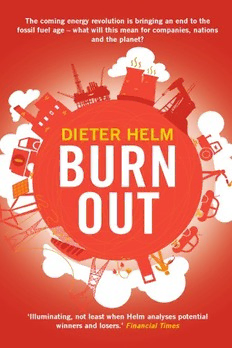Table Of ContentThe coming energy revolution is bringing an end to the
fossil fuel age – what will this mean for companies, nations
and the planet?
DIETER HELM
BURN
OUT
‘Illuminating, not least when Helm analyses potential
winners and losers.’ Financial Times
BURN OUT
Dieter Helm is fellow in economics, New College, and professor of economic
policy, University of Oxford. His previous books include The Carbon
Crunch: How We’re Getting Climate Change Wrong – and How to Fix It
(2012, 2015) and Natural Capital: Valuing the Planet (2015), both published
by Yale University Press. In 2017 Professor Helm carried out the Cost of
Energy Review for the UK government.
‘The book’s grand scope and its provocative line should provoke consider-
able and fruitful debate.’
Peter Christoff, Australian Book Review
i
ii
BURN
OUT
THE ENDGAME FOR FOSSIL FUELS
DIETER HELM
UPDATED EDITION
YALE UNIVERSITY PRESS
NEW HAVEN AND LONDON
iii
Copyright © 2017 Dieter Helm
First published in paperback 2018
All rights reserved. This book may not be reproduced in whole or in part, in any form
(beyond that copying permitted by Sections 107 and 108 of the U.S. Copyright Law and
except by reviewers for the public press) without written permission from the publishers.
For information about this and other Yale University Press publications, please contact:
U.S. Office: [email protected] yalebooks.com
Europe Office: [email protected] yalebooks.co.uk
Typeset in Minion Pro by IDSUK (DataConnection) Ltd
Printed in Great Britain by Hobbs the Printers, Totton, Hampshire
Library of Congress Cataloging-in-Publication Data
Names: Helm, Dieter, author.
Title: Burn out : the endgame for fossil fuels / Dieter Helm.
Description: New Haven : Yale University Press, [2017] | Includes
bibliographical references and index.
Identifiers: LCCN 2016043323 | ISBN 9780300225624 (c1 : alk. paper)
Subjects: LCSH: Energy industries. | Energy development—Environmental
aspects. | Energy consumption—Environmental aspects. | Renewable energy
sources. | Fossil fuels—Environmental aspects.
Classification: LCC HD9502.A2 H4549 2017 | DDC 333.8/2—dc23
LC record available at https://lccn.loc.gov/2016043323
A catalogue record for this book is available from the British Library.
IBSN 978-0-300-23448-0 (pbk)
10 9 8 7 6 5 4 3 2 1
iv
To Sue, Oliver and Laura – as always
v
vi
Contents
Preface to the updated edition and acknowledgements ix
List of fi gures xvi
List of abbreviations xviii
Introduction 1
PART ONE
Predictable Surprises
1 Th e end of the commodity super- cycle 15
2 Binding carbon constraints 38
3 An electric future 62
PART TWO
The Geopolitical Consequences
4 Th e US: Th e lucky country 89
5 Th e Middle East: More trouble to come 107
6 Russia: Blighted by the resource curse 126
7 China: Th e end of the transition 143
8 Europe: Not as bad as it seems 162
vii
viii CONTENTS
PART THREE
Creative Destruction and the Changing Corporate Landscape
9 Th e gradual end of Big Oil 183
10 Energy utilities: A broken model 204
11 Th e new energy markets and the economics of the Internet 224
Conclusion 241
Endnotes 248
Bibliography 260
Index 267
Preface to the updated edition and
acknowledgements
When you read this, the oil price could be anywhere between $20 and $100 a
barrel. It could even be outside these boundaries. Although it will matter a lot
to the companies, traders and customers, it will not tell you very much about
the price in the medium- to- longer term. The fact that the price was $147 in
2008 and $27 in early 2016 just tells you that it is volatile. Bankers, investors
and governments might get their fingers badly burned, but most will lick
their wounds and survive another day if the falls since late 2014 are only
temporary. But only if they are temporary.
From the perspective of our energy future, it is the trend and not the noise
that matters. Until late 2014, there was a broad consensus about where prices
were heading – up, ever up. Otherwise sensible and sane people convinced
themselves that the world was running out of oil, and that demand was virtu-
ally insatiable from ever- growing China and the other developing countries
in Southeast Asia, India and Africa. Constrained and then falling supply
would collide with ever- rising demand, and there would be an economic
shock making those caused by OPEC in the 1970s look tame.
Lest you think this is exaggerated, it is all there in the actions of
the companies, the trail of quotes, statements and reports, and embedded
in energy policies around the world, and especially in Europe. The oil
companies were busily developing new resources at costs of up to or
even above $100 a barrel. These ranged from the Arctic through to the
tar sands in Canada. They put their money where their analysis had
taken them.
ix

